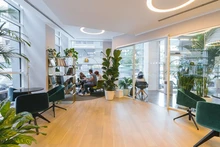
Our planet is at a critical point. We’re in a race to achieve net zero emissions by 2050, but the path is steep. Right now, less than half of all businesses believe they can hit their goals by 2030.
Across the world, both public and private sectors are under pressure to reduce their carbon footprint. In fact, 28 per cent of UK CEOs feel their operations are moderately or extremely exposed to the threat of climate change over the next year.
In response to this challenge, the spotlight turns to innovative strategies capable of steering organisations towards a greener future. Among these, office usage tracking is a promising area that hasn’t been fully explored yet. It offers two key advantages: helping the environment and making operations more efficient.
Greater energy efficiency
With buildings accounting for 30 per cent of global energy consumption and 26 per cent of energy-related emissions, our journey towards a greener future starts with making workspaces smarter and more efficient. A recent survey shows that office landlords are taking this seriously, using energy-saving technology to soften the impact of rising energy costs and to comply with new environmental regulations.
At the same time, a report from Irwin Mitchell points out that less than one-third of businesses really know how energy-efficient their offices are. This knowledge gap underscores the critical need for businesses to have a clear understanding of their workspace. The right tools then empower them to effectively manage their space and unlock its full potential.
As we look for better ways to reach our green goals, the subtle power of data from office booking systems becomes increasingly apparent. When integrated with a building control system, the data provided can help adjust heating, lighting and air conditioning in real time based on actual need, not guesses.
This not only cuts down on energy use but also points us towards the kind of flexible workspaces people are looking for more and more.
In this vein, some organisations can consider resource sharing as a smart strategy for reducing energy consumption. By having different companies or departments share a workspace, energy use for heating, lighting, and cooling is concentrated in one area, rather than spread across multiple underused spaces.
This practice not only benefits the environment by saving energy, but also reduces costs significantly. With an advanced booking system to oversee these shared spaces, organisations can ensure their premises are used efficiently, preventing resource wastage.
The commuting conundrum
As global warming exceeds crucial thresholds, with the EU’s climate service reporting the first year-long breach of the 1.5C warming limit, remote and hybrid work arrangements gain even more importance.
These models stand out as a powerful solution to cut down commuting-related carbon emissions which are key contributors to global warming.
Studies reveal that fully remote workers can slash their carbon footprint by up to 54 per cent compared to those who commute daily.
Adopting hybrid models, where staff work from home a few days a week, can then reduce emissions by 11 to 29 per cent. Supporting this, research by IWG and Arup points to the potential for significant carbon savings across major cities, emphasising the role of hybrid work in achieving these gains.
This data not only showcases the environmental upside of flexible working but also shows us why we need to make the office commute really count.
This is where the advanced workplace management systems play a crucial role. By facilitating a hybrid workforce, these systems ensure that time spent in the office is conducive to collaboration and productivity.
Such systems streamline the office experience by ensuring employees have easy access to meeting spaces or quiet areas for focused work when they’re onsite.
They also aid in scheduling meetings or coordinating in-person collaboration, making every office visit count. This strategy not only lowers the carbon footprint by reducing unnecessary travel but also improves the overall office experience for employees.
Reducing the need for new construction
In our shared goal of becoming more sustainable, we must change how we think about office space to avoid the costs and environmental impact of building new ones. Workspace management software is a key tool in this effort.
Firstly, this technology allows organisations to better use the spaces they already have. For example, by understanding actual office attendance, companies are discovering they don’t need a desk for every employee and can sometimes even relocate to smaller, more environmentally friendly premises.
Secondly, an increasing number of organisations across various sectors are seeing the benefits of sharing their buildings with others. This practice, championed by initiatives like the Government Hubs Network, demonstrates that with the right workspace management software, different organisations can coexist in the same space without compromising data security.
This approach boosts productivity, collaboration and employee wellbeing while also significantly cutting costs. The public sector has seen great success with government agencies, local authorities, and the NHS having all benefited from shared workspaces. The same model can be effectively applied across all sectors, further reducing the need for new construction.
Action for a greener future
Reflecting on the journey toward net zero emissions by 2050, the role of workspace management systems becomes undeniably important.
These systems are a practical answer to using office spaces more wisely and cutting down on energy use and emissions. This approach helps businesses realise that the answer isn’t always more buildings. Instead, it’s about better management of existing spaces as well as exploring space-sharing opportunities.
The success with shared spaces in the public sector shows us that this approach does work. As we move forward, it’s clear that adapting our workspaces thoughtfully is key in our fight against climate change. This isn’t just hopeful thinking. It’s a smart move we can make right now.










